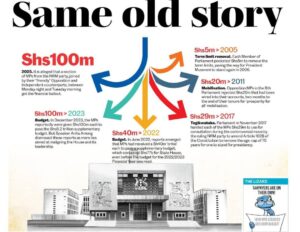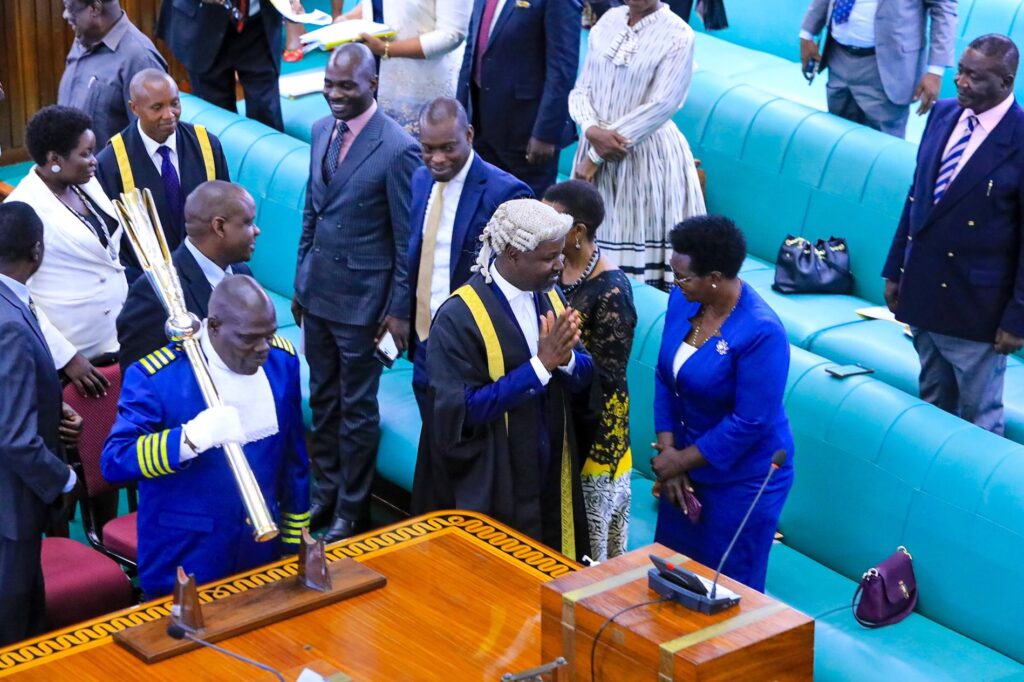By Wabusimba Amiri
When travelers descend from the skies and land at Entebbe International Airport, they are met by the tranquility of Lake Victoria’s breeze and the endless green that once moved Winston Churchill to dub Uganda the Pearl of Africa.
It welcomes you like an old friend, but a traveler curious enough to pick up a local newspaper will quickly sense a contradiction: a nation too rich in nature, yet too poor in leadership integrity.
Over the last two decades, Uganda’s Parliament has undergone a quiet transformation from a legislative body tasked with representing the people, to a sophisticated syndicate where policy is packaged for sale and representation auctioned to the highest political or financial bidder.
Year after year, scandal after scandal, this institution has woven a pattern so consistent, so calculated, and so quietly executed that its audacity can no longer be dismissed as episodic corruption.
Once again, headlines scream of betrayal, Members of Parliament allegedly walked away with over UGX 100 million each, as a “thank you” for passing two controversial bills the Uganda Peoples Defense Force Amendment and the Coffee Act.
Not for national service. Not for innovation. But for obeying the quiet handshakes behind closed doors.
The month of April begins with Fools’ Day. But for Ugandans, this was no prank. It was a painful reminder that in this country, power feeds itself first.
This practice is not new, in 2007, as Uganda prepared for the 2011 general elections, Parliament quietly approved a supplementary budget cloaked in ambiguity: “classified expenditures.”
Each MP reportedly received UGX 20 million under the pretense of “monitoring government programs.”
The context was suspect; the timing, even more so. This was an institutional bribe ahead of elections. The Parliamentary Commission, then under Speaker Rebecca Kadaga, offered no concrete explanation.
A leaked internal memo later confirmed the payments were authorized, but lacked structured reporting mechanisms effectively institutionalizing an untraceable reward culture.
A 2015 report by the Civil Society Budget Advocacy Group (CSBAG) revealed that the average MP’s monthly take-home pay exceeded that of a senior public surgeon twentyfold.
Uganda, a country struggling with a doctor-to-patient ratio of 1:25,000, had lawmakers living like CEOs while health workers rationed gloves.
Even in the eye of a deadly pandemic, Parliament upheld its tradition of personal comfort over public concern. In 2021, each Member of Parliament reportedly received UGX 200 million as a “vehicle grant.”
This was at a time when frontline health workers lacked Personal Protective Equipment, oxygen shortages were widespread, and hundreds died without receiving basic care.Activists raised red flags, Petitions were filed.
Some MPs claimed their accounts were credited without consent a puzzling defense that nobody bought. No refund was issued. The dust rose, and quickly settled. The vehicles stayed.
In March 2024, a new scandal emerged, marking one of the most audacious payouts in parliamentary history.
Over UGX 1.7 billion was allegedly disbursed among outgoing and current Parliamentary Commissioners.
Hon. Solomon Silwanyi, Hon. Prossy Akampurira, and Hon. Esther Afoyochan reportedly received UGX 400 million each. The then-Leader of the Opposition, Hon. Mathias Mpuuga, took home UGX 500 million. The reason cited? “Services rendered.”
No publicly accessible documents supported the allocations. There were no debates, no published minutes, no audit trails only bank notifications and public outrage.
The scandal, now nicknamed Cash-for-Commissioners, would become a case study in how transparency dies not by assassination, but by apathy.
While the privileged few flourish within the parliamentary dome, the broader nation buckles under systemic collapse.
Aid from international partners has declined, USAID recently announced the suspension of certain governance-related funding due to persistent concerns over mismanagement. As Parliament upgrades its furniture, hospitals downgrade their services.
As MPs receive millions in ‘facilitation,’ rural children sit under mango trees for lessons.
There is something dangerously normal about how Ugandans now react to these stories with memes, satire, and weary resignation. But normalization of graft is the deathbed of accountability.
For every unexplained billion disbursed in darkness, a mother somewhere dies in childbirth because a health center lacks gloves. For every MP who smiles at the bank, a student drops out because of unpaid school fees or lucky of sanitary pads for the girls.
The Parliament of Uganda, once envisioned as the people’s house, now sits enshrined in moral decay. Uganda’s legislature, as it stands, is not broken. It has been bought.
The pain hits hardest for the ordinary citizen the woman selling mangoes in Owino, the boda rider in Kamwokya, the teacher in Mubende who hasn’t been paid in months.
When Parliament becomes a cash cow, it’s the taxpayer who is milked dry. From the opposition to the ruling party, the only visible difference is in their colors. When it’s time to eat, unity magically returns. No debates. No accountability. Only silence and swollen wallets. This isn’t the first time. It’s not even the worst.
Every time a scandal breaks, MPs claim the money was deposited without consent. They call press conferences, wave papers, and pose for cameras.
But nobody follows up, nobody audits their accounts. And the show goes on. For a youth struggling to start a business, or a farmer praying for fair coffee or maize prices, this feels like mockery.
Our leaders no longer represent us. They represent deals. Parliament has slowly turned from the people’s house into a brokerage chamber where the currency is legislation, and the reward is taxpayer cash.
No MP has returned suspiciously awarded money. None has been criminally convicted in relation to these allocations.
Parliamentarians now openly campaign by promising not change, but influence confirming that what’s for sale isn’t policy, but access to power.

A darker implication of this trend is the commercialization of elections, a parliamentary seat is now perceived not as a civic responsibility, but as a five-year economic opportunity contract. Candidates mortgage homes, sell ancestral land, or acquire expensive loans not to serve, but to earn.
The election is not won by ideas, but by investment. Campaigns are run like startups, with expected returns in the form of committee placements, procurement deals, or direct payouts.
This makes it nearly impossible for candidates driven by ideology or patriotism to win a seat. They are outbid, not outvoted.
Uganda parliament offers a living, breathing example, the nation’s legislature operates like a closed cartel, where policy is shaped by private interest, and legislation is commodified.
It’s a case that should be dissected in law schools, debated in governance summits, and analyzed in policy think tanks. The Parliament of Uganda is no longer just a national concern it is a global warning.
The Pearl of Africa cannot shine while its custodians hoard the light. Uganda deserves a Parliament of patriots, not profiteers.
The youth must not inherit a system that normalizes theft. Scholars must document it. Artists must express it. Diplomats must question it. And the President yes, the President must confront it.
The time for glossy slogans is over. Uganda needs real reform, not rehearsed rebuttals.
Wabusimba Amiri is a communication specialist, diplomatic Scholar, Journalist, political analyst and Human Right activist. Tel: +56775103895 email: Wabusimbaa@gmail.com

Have An Advert Or Article You Want Us To Publish? Whatsapp: +256786288379 or email binocularugnews@gmail.com
